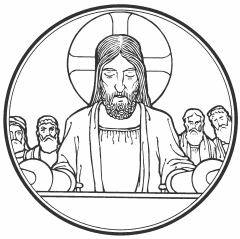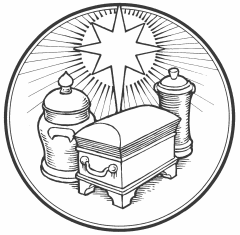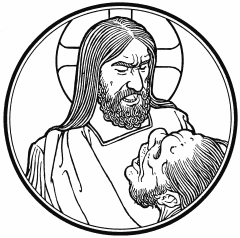 Grace, mercy, and peace to you from God our Father, and from our Lord and Savior, Jesus Christ, amen. The text for the sermon is the Gospel, which was read earlier.
Grace, mercy, and peace to you from God our Father, and from our Lord and Savior, Jesus Christ, amen. The text for the sermon is the Gospel, which was read earlier.
In today’s world, we hear plenty of bad news. We hear of war and devastation. We hear about acts of violence and murders. We hear of how loved ones have died due to sickness and disease. Needless to say, our souls are wearied by the world and by our own sinful nature. Surely there must be somewhere we can go to hear good news! My friends, you have come to that place today.
We gather in God’s house to hear good news from Jesus. The word “gospel” comes from the Greek word which means “good news.” That is precisely why we are here today, to hear the good news of Jesus Christ. That is what Jesus says today. As He reads the words of Isaiah the prophet, Jesus says, “The Spirit of The Lord is upon me, because he has anointed me to proclaim good news to the poor.” My friends, you are the poor. The good news that Jesus comes bringing is the declaration that you have been forgiven all of your sins on account of He and His actions. He declares that you have eternal life in Him because of His life, death, and resurrection. He declares that this is done for you. What good news this is that our Lord brings!
There were those who thought positive of Jesus and what He had said and done up to this point. Luke records, “And all spoke well of him and marveled at the gracious words that were coming from his mouth.” Truly this was amazing that all the people were in favor of Jesus’ words that He had just quoted. These were words of good news, speaking of God’s pardon that lifted the people up. It is a message for the spiritually poor, the captives of sin, the spiritually blind and those oppressed by guilt and shame. This was just what the people needed to hear and they did not disagree with the Lord’s words. After Jesus finished reading and sat down on the platform to give His sermon or explanation, there was a hushed silence of expectancy. Then Jesus shocks the world with the good news that He is the Messiah!
Jesus shocks the people of Nazareth when He fulfills the Scriptures. Luke records only the beginning, which in itself is the core and sum of the whole sermon. His words were shocking: “Today this Scripture has been fulfilled in your hearing.” This hometown boy returns to church as a guest, and He claims that Isaiah’s prophecy of the coming Messiah is now come true – in the person of Jesus. Jesus not only brings good news to the people, He is the Good News of God for every sinner! It’s just a shame that you and I don’t want to hear it.
Just as quickly as the people were enamored by Jesus, they turn against Him. Luke records, “When they heard these things, all in the synagogue were filled with wrath. And they rose up and drove him out of the town and brought him to the brow of the hill on which their town was built, so that they could throw him down the cliff.” The people of Nazareth reject the good news that Jesus is the Messiah and with that, everything that comes along with it. The expected response might be for the all to throw up their hands and rejoice in the hometown hero. You can almost see them wringing their hands and licking their chops with greedy anticipation. “Here is the answer to all our problems! Can you believe that this is Joseph’s boy? We really hit the lottery with this one!” Instead, the initial reaction was split. They marveled at the way or manner He spoke of God’s love for them. But then doubt is quickly planted: “Is not this Joseph’s son?” You can almost hear them contradict themselves earlier. Surely Joseph’s son cannot be the Messiah. Eventually, doubt turns into rejection.
Isn’t that just like us? One minute we are in love with Jesus and what He comes bringing and then the next, we’re ready to throw Him out of town and off the cliff. This was the problem with the hometown crowd. This is why Jesus spoke such brutal, attention-getting Law. They were stubborn in their spiritual deafness and blindness. They heard the words of Christ, but they didn’t hear the Word of God. They didn’t listen. That is us to a tee. We hear God’s Word, but we do not listen to it. We hear God’s pronouncement of forgiveness upon us on account of Jesus Christ, but we do listen to the fact that the forgiveness is by Jesus alone. We want to find that forgiveness in anything but Jesus. But there is no forgiveness in anything or anyone but Jesus.
So what does the hometown boy do? Does He leave the people with their desires or something else? He dies. He dies for the people who want to kill Him. The people get what they wanted: Jesus dies. The people should be happy. Everything worked out the way they had wanted it. And you know what? Everything did work out the way it was supposed to. Jesus died. He died for creation. He died to fulfill the Father’s will. And He was successful. He died but did not stay dead. He rose victoriously to again fulfill the Father’s will.
Even after everything that Jesus has done for creation, what is today’s response to the shocking Good News of Jesus Christ? Some reject the Good News to their own damnation. They deny who Jesus is and what He has done. They deny that Jesus is the Messiah, the One who is promised of long ago to bring about salvation for creation. But then you have the other side of the coin as well. God the Holy Spirit creates faith in your heart through the Word of the Good News of Jesus Christ for you. By faith you see Jesus’ mission completed – from Bethlehem to Calvary, from resurrection to ascension for you. By faith you see that all of Scripture points to Jesus for you.
Jesus truly is the fulfillment of God’s promises. He is the Anointed One, the Christ, the Messiah. All this He gives to us through the Holy Spirit’s gift of faith. God has promised all these things to us and today they are fulfilled in our hearing. In Jesus’ name, amen. Now the peace of God that passes all understanding, keep your hearts and minds through faith in Christ Jesus, amen.





